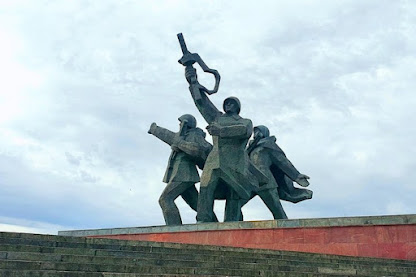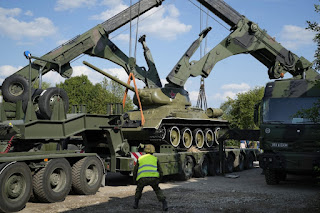Following the overthrow of Socialism in the beginning of the 1990s, the bourgeois governments in the former Soviet Republics of the Baltic region (namely Latvia, Estonia and Lithuania) engaged in long-term anti-communist, anti-soviet campaigns. The activity of Communist Parties was prohibited, communist symbols were banned and socialist-era monuments were destroyed.
In a recent episode of this anti-communist hysteria, Latvian authorities decided to proceed to the the dismantling of a 1985 memorial dedicated to the Red Army. As a pretext for this shameful act the Latvian government used the Russian invasion in Ukraine! The first question that comes to our mind is: What does the ongoing war in Ukraine have to do with the Soviet Red Army? What kind of relation does capitalist Russia have with the Soviet Union?
In a recent episode of this anti-communist hysteria, Latvian authorities decided to proceed to the the dismantling of a 1985 memorial dedicated to the Red Army. As a pretext for this shameful act the Latvian government used the Russian invasion in Ukraine! The first question that comes to our mind is: What does the ongoing war in Ukraine have to do with the Soviet Red Army? What kind of relation does capitalist Russia have with the Soviet Union?
Riga's executive director goes a step further by claiming that "for Latvians, this monument symbolizes Latvia's occupation after the Second World War and after Russia's invasion of Ukraine, we can't tolerate it anymore”. About what occupation is he talking about? Without the Red Army, Latvia and the rest of the Baltics would be pray in the claws of Nazi Germany.
Thankfully, not everyone has been brainwashed by anti-communist propaganda in Latvia. There's a large group of ethnic Russians living in Latvia. On Russia's annual Victory Day holiday in May, they always gather in front of the monument to lay flowers and hold concerts in memory of the soldiers who died in the fight against Nazi Germany.
Demolishing the monument has upset many people including Dmitry Prokopenko, co-chair of a monument support group. "I think Latvia is a land where Latvians and Russians live together," said Dmitry. "Riga is half Latvian, half Russian, and I think that one part of the state, one part of the country should also respect the rights of the other part."
Meanwhile in Estonia...
Neighboring Estonia competes Latvia on despicable acts of anti-communism. Last week, a Soviet-era monument was dismantled in Narva, a eastern border town. It is pne replica of a T-34 Soviet tank commemorates the Soviet soldiers who gave their lives liberating Estonia from Nazi Germany during World War II.
In a more than shameful comment on Twitter, Prime Minister Kaja Kallas said the decision was made due to a risk of public disorder following Russia's invasion of Ukraine. "As symbols of repressions and Soviet occupation, they have become a source of increasing social tensions," Kallas wrote on Twitter. A total of seven Soviet-era monuments in Narva would be removed, the government said.
Around 57,500 inhabitants in Narva are chiefly Russian speakers. The town council's decision on Monday to move the monument has already led to protests.
In a more than shameful comment on Twitter, Prime Minister Kaja Kallas said the decision was made due to a risk of public disorder following Russia's invasion of Ukraine. "As symbols of repressions and Soviet occupation, they have become a source of increasing social tensions," Kallas wrote on Twitter. A total of seven Soviet-era monuments in Narva would be removed, the government said.
Around 57,500 inhabitants in Narva are chiefly Russian speakers. The town council's decision on Monday to move the monument has already led to protests.


